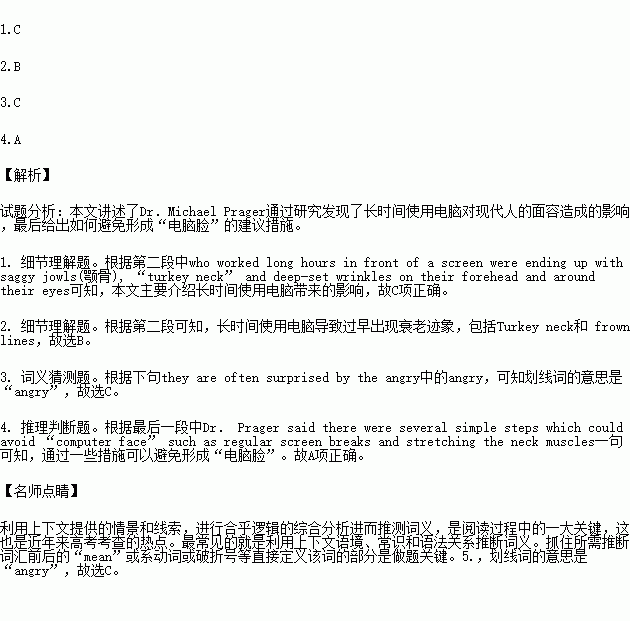题目内容
Dr. Michael Prager, a leading Botox expert, said that a growing number of women are developging something called “computer face”. He also said that professionals who worked long hours in front of a screen were ending up with saggy jowls(颚骨),“turkey neck” and deep-set wrinkles on their forehead and around their eyes.
The Botox expert said that, of all his clients, office workers were most likely to show premature (过早的) signs(迹象) of aging. “If you are one of the unfortunate people who frown(皱眉)while you are concentrating on the screen then, over time, you will end up with frown lines.” Dr. Prager said. “What is perhaps more surprising is the number of women with saggy jowls because they are sitting in one position for so long. If you spend most of the time looking down then the neck muscles shorten and go saggy, eventually giving you a second neck.”
Dr. Prager, who has a practice near Harley Street in London, said he encourages his clients to put a mirror next to their computer so they can see if they are frowning at the screen. “When people are stressed or thinking hard about something, then they will often put on a ‘grumpy face’ without even knowing what they are doing. When my clients put a mirror next to their desk, they are often surprised by the angry, frowning face which stares back at them.”
He said, “The women I am seeing at the moment have only been using computers at work for the last decade or so. But women in their 20s have grown up with them and use them for every single task. I think the problem is going to become much, much worse. In another ten years, they could be looking quite awful.”
Dr. Prager said there were several simple steps which could avoid “computer face” such as regular screen breaks and stretching the neck muscles. And, of course, there was always Botox. He said that, after a couple of sessions of Botox, the habit of “grumpy face” could be broken.
1.According to the passage, what makes women develop a “computer face”?
A. Frowning every now and then.
B. Concentrating on computers frequently.
C. Working too long in front of a screen.
D. Sitting in the same place for a long time.
2.According to the passage, which of the following are signs of aging?
A. Saggy jowls and short necks.
B. Turkey neck and frown lines.
C. Deep-set wrinkles and angry faces.
D. Second neck and stressed muscles.
3.The underlined word “grumpy” in Paragraph 3 probably means?
A. happyB. surprisedC. angryD. relaxed
4.From the last 2 paragraphs, we can know that ________.
A. “computer face” is avoidable
B. we should give up using computers
C. we should break the habit of “grumpy face”
D. the younger generation is worse at computers

